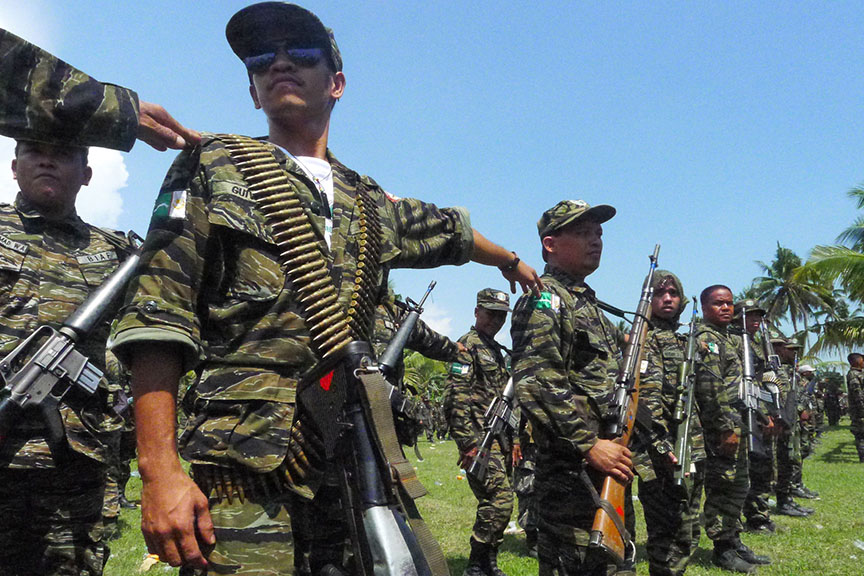GENERAL SANTOS CITY (MindaNews / 3 May) – With two years before the 2025 parliamentary elections and the end of the transition period in the Bangsamoro region, the national and regional governments need to speed up the decommissioning of former Moro Islamic Liberation Front (MILF) rebels and the dismantling of private armed groups (PAGs) maintained by local political elites, among others, to ensure the success of the peace process in Mindanao, the independent International Crisis Group (Crisis Group) said.

In a 44-page report titled “Southern Philippines: Making Peace Stick in the Bangsamoro” released Monday, Crisis Group noted that “with only two years before the 2025 election season kicks off, time is running out to achieve the peace deal’s goals.”
“The paramount goals are for national and regional authorities to defuse local conflicts, ensure that MILF rebels continue to hand in their weapons, support their full transition to civilian life and disarm the ubiquitous clan militias,” Crisis Group said.
“The closer authorities get to these objectives, the smoother the path will be toward the 2025 parliamentary elections, and successful completion of the decades-long effort to bring peace and autonomy to the Bangsamoro,” it added.
For the first time, the Bangsamoro Autonomous Region in Muslim Mindanao (BARMM) will hold its first parliamentary elections in 2025, simultaneous with the national and local elections.
The BARMM was supposed to hold its first parliamentary election in May 2022, but was postponed by former President Rodrigo Duterte through Republic Act No. 11593.
The postponement effectively extended the mandate of the Bangsamoro Transition Authority (BTA) for three more years up to 2025. The BTA is the body tasked to govern the Bangsamoro region, which was created in 2019 following the ratification of Republic Act 11054 or the Organic Law for the BARMM.
Georgi Engelbrecht, Crisis Group Philippines senior analyst and author of the report, stressed the need for the different stakeholders to work to fully realize and sustain the gains of the Bangsamoro peace process.
“A model for what can be achieved through an inclusive and democratic effort to resolve a longstanding conflict, the Bangsamoro deal must not be allowed to fail—both for those who benefit from it, and those who stand to emulate it,” Engelbrecht said on Messenger.
He pointed out that at present, threats to the Bangsamoro peace process are coming from within such as community disputes, clan feuds and intra-MILF clashes, which, according to him, should not be overlooked.
“For lasting peace to take hold, national and interim regional authorities must quell violent instability and speed up elements of the peace process that are behind schedule,” he added.
In its report, Crisis Group said that a successful Bangsamoro peace process “would of course be most keenly felt in the region, but its symbolism would likely resonate beyond the Philippines, given the extent to which the Bangsamoro has become an example of a negotiated, democratic approach to addressing long-term conflict.”
The Comprehensive Agreement on the Bangsamoro (CAB), which provides for the creation of a Bangsamoro region, was signed by the Philippine government and the MILF in 2014 after 17 years of negotiations.
Under the almost one year administration of President Ferdinand Marcos Jr., Crisis Group noted that the Bangsamoro peace process, despite many obstacles, is progressing—and facing perils as well.
It noted the “biggest risk now is that lingering hindrances—such as issues related to decommissioning of MILF fighters and local violence—will hobble the peace effort.”
“Rather than allowing themselves to be hamstrung by these issues, Manila and the interim authority should work cooperatively, creatively and in the spirit of compromise that allowed the 2014 peace agreement to be reached,” Crisis Group said.
Data from the Office of the Presidential Adviser on Peace, Reconciliation and Unity (OPAPRU) showed that at least 24,844 of the 40,000 strong MILF members have been deactivated as of April 2023.
At least 4,625 weapons and about 6,852 ammunition have also been decommissioned since the program started in 2015, it added.
The parties agreed to resume the decommissioning process of the remaining 1,300 combatants under Phase 3 in mid-2023.
OPAPRU revealed that at least P3.15 billion have been poured by the government for the socio-economic aspect of the normalization phase.
Bangsamoro Education Minister Mohagher Iqbal, MILF Peace Implementing panel chair, was reported as saying in an OPAPRU statement that the fourth and final phase of the decommissioning process “will take place following the substantial compliance of both parties to all the provisions of the peace agreement.”
Apart from the issue on the deactivation of MILF forces and their weapons, and the local violence caused by extremist groups such as the Bangsamoro Islamic Freedom Fighters and the Abu Sayyaf Group, Crisis Group pointed out that a big obstacle to enduring peace in the Bangsamoro region is clan politics.
The powerful political clans often employ what amount to private armies, it said, adding that although these militias pose no threat to national security, Manila needs to get serious about dismantling them.
The presence of these militias is one of the reasons why MILF fighters hesitate to give up their guns, the report noted.
According to estimates, as many as 100,000 unlicensed firearms are in circulation in the Bangsamoro region, the report said.
Last year, at least 20 private armed groups were dismantled in Mindanao, including in the BARMM, ahead of the May 2022 national elections, the National Task Force for the Disbandment of Private Armed Groups reported.
The Bangsamoro region comprises the provinces of Maguindanao del Sur, Maguindanao del Norte, Lanao del Sur, Basilan, Sulu and Tawi-Tawi, the cities of Marawi, Lamitan and Cotabato, and 63 villages from six towns in North Cotabato called the Special Geographic Area. (Bong S. Sarmiento / MindaNews)
0 Comments